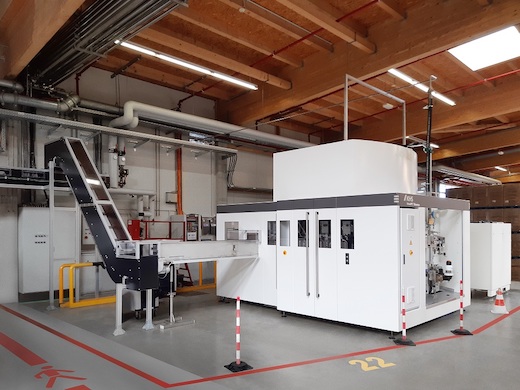Energy-Efficient Production of Weight-Optimized Oval PET Bottles: Henkel Opts for Preferential Heating from KHS
Press release from the issuing company

Henkel recently invested in a KHS stretch blow molder featuring preferential heating for its facility in Wassertrüdingen, Germany. Reducing the bottle weight and increasing the amount of recyclate used in the packaging were key factors behind the investment.
- Reliable KHS PET systems in operation for decades
- First-time investment in a stretch blow molder for the beauty segment
- In-house production improves ecological footprint and simplifies logistics
Dortmund – With preferential heating KHS provides an energy-efficient method for producing oval PET bottles with an optimized weight. Not only the food industry but also consumer goods manufacturers such as Henkel are opting for this cutting-edge technology. It also enables complex containers to be economically produced in house, with no need for external procurement. In using preferential heating Henkel improves its ecological footprint and simplifies its logistics and production processes. At its facility in Wassertrüdingen, Germany, the concern has now invested in a KHS stretch blow molder featuring the new technology for its Fa body care brand. Reducing the bottle weight while simultaneously increasing the percentage of recyclate used in the packaging were the key factors that influenced Henkel’s decision to buy.
Henkel has relied on stretch blow molding technology from KHS for decades. The Dortmund system supplier’s tried-and-tested Blomax machines with preferential heating are used to make containers for fabric softener and household detergents in the company’s Laundry & Home Care business unit worldwide – and in Germany now also for shower gel. “With this measure, we’re consistently aiming to further reduce our ecological footprint throughout our value chain,” says Claus Meyer from Henkel Beauty Care.
Thanks to proven KHS technology and a capacity of up to 21,700 bottles per hour, Henkel’s production processes are now even more efficient. The company also benefits from a more flexible logistics setup, confirms Björn von Lengerke, global product account manager at KHS. “You can make the respective containers for the various products yourself. This makes production plans more flexible.” At the same time, fewer resources are used as trucks no longer have to travel lengthy distances – an important consideration when it comes to climate protection.
More sustainable production: reduced weight and use of recyclate
As a reliable partner KHS is helping to make Henkel’s portfolio more sustainable. Thanks to the former’s holistic Bottles & Shapes™ container design consultancy program, the customer’s 250-milliliter bottle now consumes 14% less material than previous versions – while maintaining the required bottle quality. The bottles also consist entirely of recycled PET, with 25% of this what is known as Social Plastic. “We’re planning on also increasing this percentage in other containers in the future in order to make our entire portfolio even more eco-friendly,” says Christian Bauer, managing director of Henkel’s Wassertrüdingen production site. By 2025, for instance,100% of Henkel’s packaging is to be recyclable or reusable.
Even with high recyclate contents of up to 100% extremely oval bottles can be formed, according to KHS expert von Lengerke. “In the preferential heating method preforms are first heated in the heater as they rotate. In the downstream section rotation is then stopped, so that only certain areas of the PET preforms are heated further.” A heater box specially designed for this purpose transfers the required heating energy through opposite heater levels. “This optimizes the material distribution and stability of the bottle,” von Lengerke continues. This process has various advantages not only in the beauty care range but also when processing cleaning agents, laundry detergents or personal care products that are very often filled into oval PET bottles.
- Questions to ask about inkjet for corrugated packaging
- Can Chinese OEMs challenge Western manufacturers?
- The #1 Question When Selling Inkjet
- Integrator perspective on Konica Minolta printheads
- Surfing the Waves of Inkjet
- Kyocera Nixka talks inkjet integration trends
- B2B Customer Tours
- Keeping Inkjet Tickled Pink
© 2024 WhatTheyThink. All Rights Reserved.














